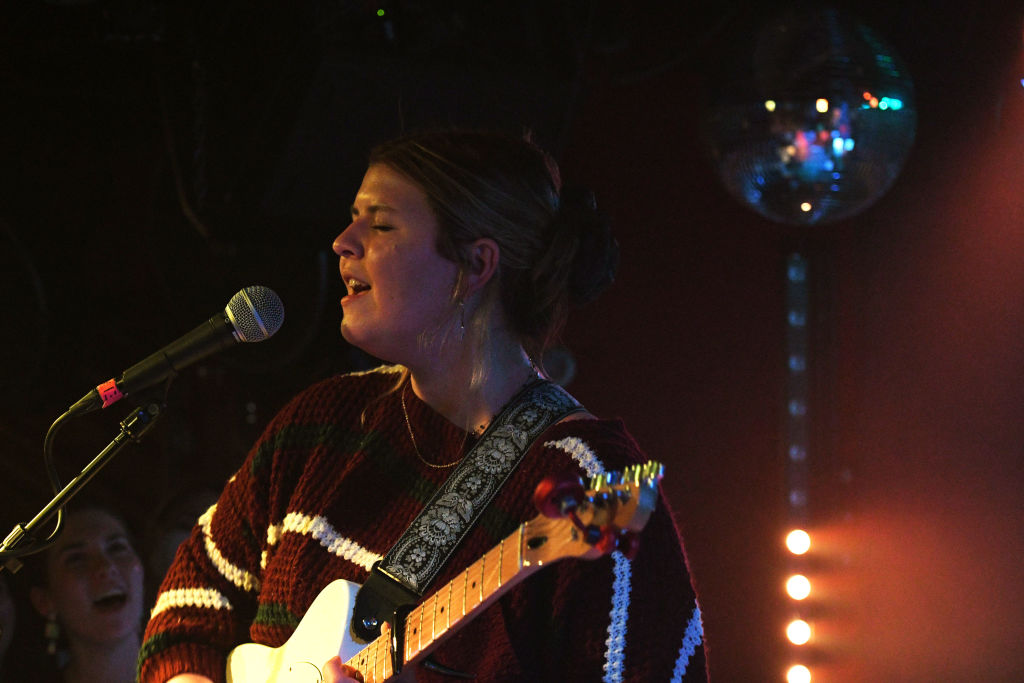Music
 Eliza McLamb. Photo by Jenna Schwartz.
Eliza McLamb. Photo by Jenna Schwartz.
Rising to Internet Fame, Songwriting + Returning to The District: An Interview With Eliza McLamb
March 9, 2023 @ 12:00pm
A conversation with Eliza McLamb before her sold-out show at DC9.
Music and social commentary often mesh together well, and Eliza McLamb is proof. Over the last couple of years, McLamb’s name has catapulted into internet fame with her song “Porn Star Tits” becoming a TikTok sensation in 2020. Simultaneously, the 22-year-old found success being one half of the viral podcast “Binchtopia,” which she co-hosts with her friend Julia Hava.
Entering the stage at her intimate sold-out show at DC9, McLamb was welcomed by familiar faces and some new ones. Beginning college at George Washington University in 2018 and dropping out as the pandemic hit, the artist is no stranger to D.C. The crowd included some former classmates, who cheered her on as she began with her somber song “Pulp,” a track off of her recent EP, “Salt Circle.”
From releasing “Porn Star Tits” to deciding to take the song off streaming platforms, McLamb has found herself in a new chapter with her music. Trading the upbeat satirical style for reflective, indie-folk, she has refocused her songwriting to feel more genuine to her. During the performance, McLamb’s authenticity shined through, adopting a warm repartee with the audience between each song.
Prior to performing at DC9, District Fray spoke with McLamb about her career and life in the public eye, her openness in both her songwriting and podcasting, her musical influences and returning back to the District.
District Fray: It kind of seems like in the past couple years your career in the public eye has skyrocketed. How’s the experience been for you?
Eliza McLamb: I think playing shows really makes it real because a lot of that happened online. Over the summer of 2020, I just started posting songs on TikTok. And then those started blowing up. I feel lucky that I was able to kind of jump in right when I was fresh.
When I moved to LA, I met Julia [Hava] and then we started the podcast in the winter of 2020 because we were in quarantine, and nobody was going anywhere. I always knew that if people listen to the podcast, people would listen to the music, because there are numbers and other metrics to reflect that.
You’ve also talked very publicly about dropping out of college and moving to a farm in Kansas and then traveling around the country. How do you think that those experiences have impacted you both on the podcast with Julia and then ultimately a songwriter?
It was just a time when I had to sort of figure things out for myself. I had come from this big academic pipeline, essentially, where I thought I was gonna study political science and go to law school. I was very committed to going down this set path. And then that was sort of ripped away from me, and I had to figure out what it is I really wanted to do with my precious time here on Earth. I decided it was not law school. I was able to spend that summer, without any guarantees of where I was going to live or what I was going to do and got to really just lean into my own sensibilities, which I feel super grateful for. That summer really showed me that I can make a home for myself anywhere that I go. It established a baseline, confidence and comfort with myself that’s allowed me to take these bigger career risks and allows me to be more vulnerable in my music and otherwise.
When you’re songwriting, especially with a song like “Irish Exist” or “Doing Fine,” what goes into those deeply emotional, soul-bearing songs? What does your songwriting process typically look like for you?
I think there is a point where the songs need to come out, where it’s almost like a dam breaking. And I kind of blackout, I don’t really think about it much. All my songs I write with an instrument in hand, unless I’m driving and have an idea in my head. I’ve written almost 100% of the songs sitting on my floor. Songwriting has always been the way I figured stuff out so it’s usually just a moment where things have gotten too confusing or too much or overwhelming in one way or another and I need to actually sit down and figure it out.
Sometimes it feels as though I’m more of a conduit for something larger and more spiritually connected. I try not to analyze my own process too much. Because when that happens, I end up feeling as though I need to stick to a list of rules about how to write an Eliza McLamb song and feeling annoyed and confined by myself.
Your sound is traditionally more indie folksy and styled in a very classic singer-songwriter manner. How did you discover your sound?
I’m definitely still figuring out my sound, which has been a big process with the record I’m writing right now. I think for a long time I was kind of afraid or maybe anxious about how to fit myself into a box. I definitely feel naturally inclined to the folksy sort of stuff just because I grew up in North Carolina and a lot of that sound reminds me of home. Especially with this new record, I’m experimenting with some more true rock songs. I was afraid of pop for so long [until recently], probably because of a lot of internalized misogyny and not being well-educated on the history of pop music.
You recently made the decision to take “Porn Star Tits” off Spotify and other streaming platforms. What went into the decision to take this song down even though it has like 3.5 million streams?
I felt like it didn’t represent who I was as an artist. I don’t think it’s a terrible song. It just is really not something I would choose to listen to. I wasn’t comfortable with it being the first thing that everybody saw when they came to my catalog. Also, it was a product of what I was writing for TikTok, which is instantly catchy, a little kitschy, and kind of tongue-in-cheek. I think the song is smart, but I also think that there are a lot of cheap shots in there. I think my songs now are more complex and that’s what I like about them. “Porn Star Tits” definitely has a special place in my heart, but ultimately it’s just not worth it for me.
How does it feel to be back in D.C., the city you lived, studied, and worked in right out of high school? Does it feel weird to be back?
I definitely had a crazy moment. When I came back earlier in 2022, I watched my friend graduate, which would have been the same year that I would have graduated if I had stayed. And that was a very weird timeline-crossing moment where I was envisioning what would happen if I had stayed in college. I got all the weirdness out on the last trip and now I’m just kind of excited to walk around and see new places. I still have some college friends that still live in the city, so I’m excited to see them. D.C. has a very special place in my heart.
How does it feel to sell out your DC9 show?
It’s pretty sick. I’m not gonna lie. It sold out in a day. It’s really, really cool. Especially because I just put music on the back burner for so long. I never thought it was going to be something I would do for real. It even stopped me from doing extracurricular things and in college, I was in a cappella groups for fun, but I never tried to start a band or start trying to record. It feels nice to be able to come back in this context.
Learn more about McLamb and her music by streaming her music here or follow her on Instagram @elizamclamb
Listen to “Binchtopia” here and follow the podcast on Instagram @binchtopiapod
DC9: 1940 9th St. NW, DC; dc9.club // @dc9club
Enjoy this piece? Consider becoming a member for access to our premium digital content. Support local journalism and start your membership today.







